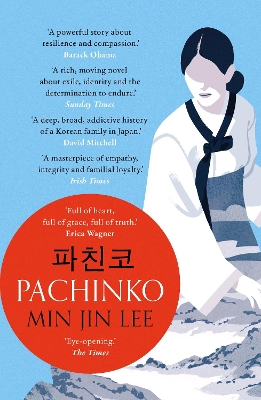Reviewed by nannah on
Content warnings:
- cr ableist slur (used as a noun)
- r ableist slur
- ableism
- rape
- pedophilia, grooming, csa (shown on page)
- abuse against a sex worker
Representation:
- most of the characters are Korean
- a few secondary characters are Japanese, and one of them is gay
Pachinko is the story of a Korean family that largely centers on a girl named Sunja (well, a girl at the beginning of the novel). It begins with her unfortunate seduction and grooming by a wealthy Korean man living in Japan. When Sunja becomes pregnant, he reveals that he’s married, and Sunja refuses to become his “wife in Korea”. She marries a big-hearted Christian minister who, funnily enough, is on his way to Japan. But war is coming, and the father of her son won’t risk losing his only male heir.
Even if the writing gets awkward at times, I’m captivated by the story. Only during the last fourth, when the novel got around to the last generation told through the PoV of Sunja's grandson, did my interest wane a little. I hear this is a common problem with family sagas, because so much time is spent making sure the audience falls in love with the earlier generations. Naturally we’re just more attached to them.
The differences in PoVs are handled masterfully, especially in the case of highlighting generational differences, differences in how children are raised in Korea or Japan, each character’s experiences, and what they’re told while growing up. The first generation still loves and longs for Korea, and tells their children they represent all Koreans, while the children are told a different version of the same thing at school: “‘you must be an excellent person--at school, in town, and in the world. No matter what anyone says. Or does.’ (...) ‘Yes, appa.’ Hoshii-sensei had told [Noa, the child] that he had a duty to Koreans, too; one day he would serve his community and make Koreans good children of the benevolent [Japanese] Emperor.”
Also done very well is the fetishization of Koreans: “She would always believe that he (...) wasn’t himself but some fanciful idea of a foreign person; she would always feel like she was someone special because she had condescended to be with someone everyone else hated. His presence would prove to the world that she was a good person, an educated person …” So while there are definitely some slow bits and some awkward phrasings, and characters I’m just not as invested in, there are absolute jewels like these quotes that make it impossible to stop reading, even at two in the morning.
This novel covers a hell of a ton, and thinking back on that, I do kind of think the author may have stuffed a bit too much into a single story. But everything that was here was done incredibly well. I also know there’s a show made based on this, so I’ll have to check that out soon (and anything else written by Lee Min-jin)!
Reading updates
- Started reading
- 2 August, 2022: Finished reading
- 2 August, 2022: Reviewed
